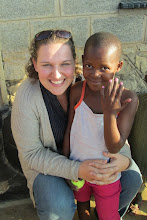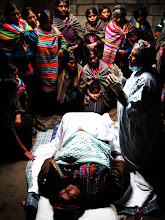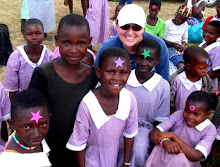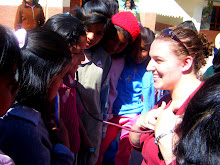I have travelled at different times in my life, for many different reasons. Sometimes for guilty pleasure, occasionally to explore and learn, and at others for adventure or sport. I have been the obnoxious tourist, complete with kitschy photos in front of "post card perfect" sites, boisterous excitement, and fanny-pack tackiness. I know what it is to travel for personal gain and comfort.
Yet on my latest trip to Botswana I witnessed some tourist-classic behavior that made me flinch at the audacity, blind-arrogance, and naiveté of westerners. It made me embarrassed for them, and after two years of living immersed in an indigenous culture, defensive of the rights and integrity of the local people.
Here are some of my observations about ethical and "culturally-sensitive" travel:
1) Culture isn't for your entertainment, and indigenous people aren't its performers.
While in Botswana we stayed at the D'Qae Qare Game Reserve, a reservation owned by the local Naro San people and dedicated to their cultural preservation. During our stay, several different groups of tourists trickled through. We were all there for the same reason: To learn about the local bushmen culture. Yet it quickly became obvious to my travelling companion, Amanda, and I that not everyone went about "receiving" the culture and local people the same way.
One night, we were seated around a family-style dinner with a large group of German tourists. Amanda and I had already been there for two days, and had made a point to get to know the San staff. After all, what better way to know the culture than to know the people, right? The cook, Dinah, was a jovial, pretty woman in her mid-30’s who seemed to be the life and glue of the staff. Despite her many roles on the reserve, she constantly toted her 6-month old baby, Anne, around on her hip or back. We came to absolutely love Dinah during our time at D’Qae. That night, as she served dinner she stopped to explain the dishes in her near-perfect English (a truly impressive feat for someone who is entirely self-taught in the language.) As she excused herself to go back to the kitchen, a tall blonde man stood up. "Can you say something in your own language?!" he shouted at her excitedly, as if prepared for a great amusement. Dinah nodded cordially, and commenced to reintroduce the dishes in Naro (the local "click" language, for which the man didn't even have the courtesy to ask of the proper name of first).
It was a performance by any standard. Dinah did well. She held her bearing and smiled, but I was mortally affronted for her, and for the thoughtless man. He had treated her no better than a circus performer. I wanted to tell him... ‘If you're interested in hearing a local language, spend some time with the people. If you're interested in witnessing a piece of their culture, have the decency to respect their traditions by referring to them by name.’
2) Pause. Look around. Realize WHERE you are. If you aren't ready for the reality of a place, then don't travel there.
I understand that westerners are accustomed to a certain level of comfort. When travelling, however, it's important to remember that not all corners of the world are capable of or designed to cater to your every whim. If you're not prepared to accept that, then DON'T TRAVEL THERE. Travelling is a choice. YOUR choice. If you don't want rocky roads and cold showers, then for goodness sakes don't go to the middle of the bush in northwestern Botswana.
On more than one occasion during my time in Botswana, I witnessed tourists complain about everything from the accommodations to the roads to the food to the imperfections of the staff's English (which, by the way is their THIRD language, after Naro and Setswana). It was offensive to watch people bad-mouth the local people for things that 1) the locals live with EVERY day without complaint, and 2) they can't change. There is no way to make the remote bush into a Hilton Hotel without destroying the very essence of the place and culture you are trying to preserve. And being hyper-focused on your physical surroundings often means you miss the kindness, generosity, and genuine hospitality of the people all around you.
If you're not prepared to accept cultural travel with humility and a grateful heart, then don't go.
3) You are a guest in THEIR country, culture, and community. Stop expecting everyone to speak English.
This is a common hazard of travelling… And I absolutely understand. The inability to communicate can be frustrating. You need answers. Maybe you’re lost in a strange place. You don’t know what’s going on. Confused. It’s disarming and uncomfortable, right? Embrace it. Taking your frustration out on host country nationals because YOU can’t communicate is your problem, not theirs. You are a guest. You chose to travel to a place where YOU don’t have the necessary skills to live. Uncomfortable? Then stay at home. Angry? Then look around and realize that you are the one that doesn’t belong.
Westerners expect everyone to speak English… And I know, it’s an international language, you’re paying good money, yada, yada, yada… But in my experience, host country nationals make a HUGE effort to try to speak English, even though it’s uncomfortable for them as well, they’re in their own country, AND they often have had little to no opportunity for formal training in the language. All I’m saying is, try to meet them half-way. Look at language as an opportunity to bridge cultural divides and show that you’re a good sport.
Yet again… It all comes down to travelling with grace and humility.
4) Being poor doesn't make you stupid. Being different doesn't make you incompetent.
I see this a lot in Peace Corps… Americans frequently get frustrated working with people that think and work different ways than they’re accustomed to. Perhaps a business meeting starts two hours late because people sit around talking about their families forever. It’s frustrating; I understand. It happens ALL the time in Lesotho. Yet we often undervalue what we don’t understand. The business meeting starting late isn’t a sign of disrespect for everyone's time, it occurs from a belief that relationships are important. It’s a subtle yet important difference, that takes time and humility to understand.
There are many ways to exist in the world, and none is more right or wrong than any other. The same can be said for knowledge. There are many different types of knowledge and intelligence, and (hold onto your hats engineers!), not all of them are quantifiable or even written. How many people look down on the uneducated, illiterate poor as lesser? Yet I would guess that these same people, utterly overlook the incredible genius of a San man who can recite the individual names and uses of a thousand different plants and herbs. Or a woman who remembers, word for word, an hour long legend passed down from her ancestors.
Culture is powerful. It affects the way we think about time, what forms of knowledge we value, how we prioritize values, and how we go about work. When travelling, don’t make the terrible mistake of confusing being poor or illiterate with stupid or incompetent. To do so would be to miss out on the incredible plethora of gifts and worldviews present amongst humanity.
So next time you think your waitress in a foreign country seems lazy, or that the guy sitting on the street corner begging must be stupid, stop and step out of your own prejudices and worldview for a second. You might be surprised by what you find when you give people the benefit of the doubt.
5) YOU are not entitled to people's images, stories, or experiences.
Travelling can be exciting… Perhaps you’re like me and have the impulse to try to capture and preserve everything you see and experience. I constantly have a camera in my hand. I always seem to want to document every image, story, and experience. And it’s always a challenge to try to find a way to respectfully capture these pieces of peoples lives. Do you ask permission? Does it make them uncomfortable? Should you pay them? It can be a tricky thing.
But I think perhaps that’s the point… It should be tricky. Taking something as intimate as a person’s image or story should always be a question, not a demand.
You are not entitled to peoples images or stories, and to assume so, by snapping photos without permission or by asking intimate questions can be both impolite and offensive, depending on the culture. Westerners often haphazardly snap photos of strangers, without think twice about how that may make the local people feel. Or they hear or witness things abroad, go home, and then relay the stories and lives of local people as cocktail party jokes.
When I travel and spend time with local people, I try to remind myself that their stories and images are gifts. They should be offered, not taken. They should be guarded and respected for the lives of the people they represent.
6) If you want to know a place, know the people.
I suppose the entire point of this post, boils down to this… If you want to know a place, then you should get to know the people. People matter. In my opinion, there’s nothing more important in life than the way you treat another human being. It’s sacred. And when you travel, you leave footprints behind you. You affect the local people when you visit a place. Your behavior will be remembered (more than you ever know… Trust me on that one!) and it will in turn affect the way the people you met think about your culture and country.
So look at travelling as a gift… Something to be approached with reverence and humility. Travel ethically. Know that you left the world a better place than when you ventured into it. You’re being trusted with other people’s sense of self and integrity. And that’s a huge responsibility.
With Love from Lesotho… Mary E.






